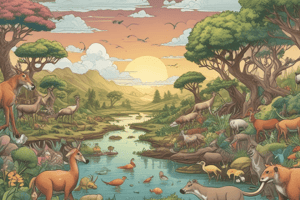Podcast
Questions and Answers
What is the primary purpose of a food web in an ecosystem?
What is the primary purpose of a food web in an ecosystem?
- To represent the nutrient cycles in an ecosystem
- To identify the species richness in an ecosystem
- To show the energy flow from the sun to producers
- To provide a complete picture of who consumes whom in an ecosystem (correct)
What percentage of total light falling on green plants is utilized for photosynthesis?
What percentage of total light falling on green plants is utilized for photosynthesis?
- 5%
- 10%
- 20%
- 1% (correct)
What is the term for the transfer of energy from one trophic level to another?
What is the term for the transfer of energy from one trophic level to another?
- Energy flow (correct)
- Trophic level transfer
- Energy cycle
- Nutrient flow
What type of consumers can occupy more than one trophic level in a food web?
What type of consumers can occupy more than one trophic level in a food web?
What is the process by which solar energy is transformed into chemical energy?
What is the process by which solar energy is transformed into chemical energy?
What is the term for the network of interconnected food chains in an ecosystem?
What is the term for the network of interconnected food chains in an ecosystem?
What is the primary source of energy for most food chains in an ecosystem?
What is the primary source of energy for most food chains in an ecosystem?
What is the term for the food chains that start from dead organic materials?
What is the term for the food chains that start from dead organic materials?
At each linkage in the food chain, what happens to a major part of the energy from the food?
At each linkage in the food chain, what happens to a major part of the energy from the food?
How many links are usually present in a food chain?
How many links are usually present in a food chain?
What is the term for the interconnected network of food chains in an ecosystem?
What is the term for the interconnected network of food chains in an ecosystem?
What is the result of a single species being linked to a large number of species in a food chain?
What is the result of a single species being linked to a large number of species in a food chain?
What happens to the energy as we go along the trophic levels?
What happens to the energy as we go along the trophic levels?
Why do food chains typically have fewer links?
Why do food chains typically have fewer links?
What is the advantage of a vegetarian diet in terms of energy availability?
What is the advantage of a vegetarian diet in terms of energy availability?
What is the complexity of food relations in natural ecosystems?
What is the complexity of food relations in natural ecosystems?
What is the consequence of energy loss at each trophic level?
What is the consequence of energy loss at each trophic level?
What is the result of having fewer links in a food chain?
What is the result of having fewer links in a food chain?
Flashcards are hidden until you start studying
Study Notes
Food Chains and Food Webs
- When multiple food sources are available, food chains branch out and form a food web, providing a complete picture of who consumes whom in an ecosystem.
- A food web represents the transfer of energy and nutrients among organisms in an ecosystem, while a food chain shows only one pathway.
Energy Flow in the Ecosystem
- Energy is necessary for all biological activities, and its transfer from one trophic level to another is called energy flow.
- Solar energy is transformed into chemical energy through photosynthesis, with only 1% of total light being utilized.
- Energy flows from the sun to plants and then to heterotrophic organisms, including consumers.
Food Chains
- Energy must pass from one living organism to another, with energy being transferred from plants to animals when herbivores feed on plants.
- At each linkage in the chain, a major part of the energy is lost for daily activities, with most chains having only four to five links.
- A single species may be linked to a large number of species, and food chains can be either Grazing (starting from green plants) or Detritus (starting from dead organic matter).
Trophic Levels
- Every biological community can have multiple and diverse food chains, but every food chain starts with a primary source of energy.
- Species can occupy more than one trophic level, with humans being an example of multilevel consumers or omnivores.
- Energy decreases successively at each trophic level, with only a small fraction (about 10%) going on to the next level.
Implications of Energy Flow
- The quantity of energy decreases rapidly from primary producers to the top consumer, explaining why food chains have fewer links.
- Supporting a larger human population on a vegetarian diet could be possible, as it involves one step in energy transfer, minimizing energy loss.
Studying That Suits You
Use AI to generate personalized quizzes and flashcards to suit your learning preferences.




